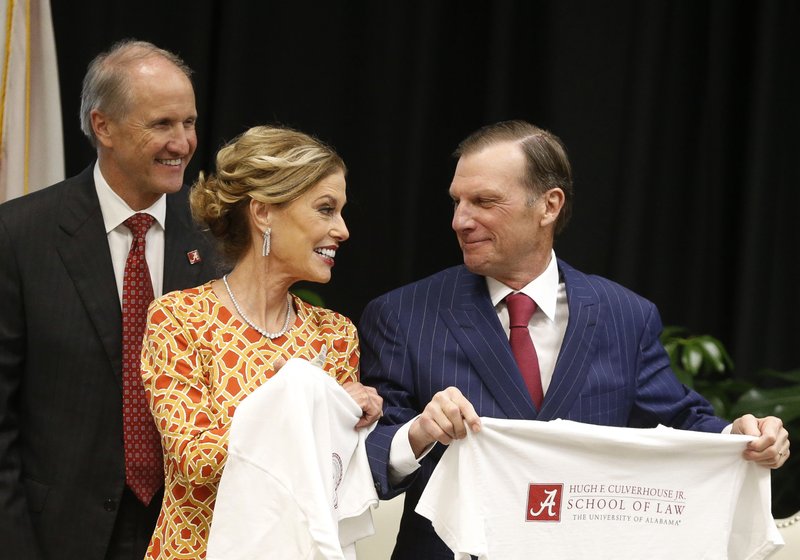TUSCALOOSA, Ala. -- The University of Alabama gave back a philanthropist's $26.5 million donation and took his name off the law school Friday, a week after he called on students to boycott the institution over the state's new abortion ban.
Hugh Culverhouse Jr., a 70-year-old Florida real estate investor, said he has no doubt the board of trustees acted in response to his remarks, and he complained that the state of Alabama is only reinforcing its reputation as "the land of the backward," full of "hicks."
University officials emphatically denied the decision had anything to do with Culverhouse's stand on the abortion law and said it was prompted instead by his attempts to dictate how the money should be spent. They did not elaborate.
Culverhouse's pledge, announced in September, was the biggest contribution ever made to the university. In return, the law school was renamed the Hugh F. Culverhouse Jr. School of Law.
Within minutes of the trustees' vote, a maintenance crew had removed his name and the university had wired him a $21.5 million refund of the money he had already given the university toward fulfilling his pledge.
Alabama's toughest-in-the-nation abortion ban, passed last month and set to take effect in November, would make terminating a pregnancy a crime punishable by 10 years to life in prison for the provider, with no exceptions for rape or incest.
Last week, Culverhouse urged students to boycott the university over the ban, saying: "I don't want anybody to go to that law school, especially women, until the state gets its act together."
Hours later, the University of Alabama announced that it was considering giving back his money -- a move it said was underway even before Culverhouse spoke out.
University Chancellor Finis St. John IV said Friday that Culverhouse's expectations for the use of the gift were "inconsistent with the essential values of academic integrity and independent administration" at Alabama.
St. John said that "for these reasons and for these reasons alone," he recommended returning Culverhouse's gift.
Culverhouse acknowledged telling the university that the law school should admit more students and that his donation was intended to fund scholarships to achieve that. But he said he thought the matter had been resolved.
The businessman and attorney did not attend the Alabama school, but his parents did, and the business school bears the name of Hugh Culverhouse Sr., a tax lawyer, developer and philanthropist in his own right who owned the NFL's Tampa Bay Buccaneers.
After the trustees' vote, the younger Culverhouse said that he and his father had donated to the university over the years in part to rid Alabama of a certain stereotype: "We are the land of the backward, we are hicks, we lack the sophistication to see two sides to an argument."
"What have you done Alabama? You have effectively put a 12-gauge in your mouth and pulled the trigger," Culverhouse said. "You have reinforced that horrible stereotype that my father and I have tried so hard to eliminate."
Robert Kelchen, a professor of higher education at Seton Hall University in New Jersey, said it is unusual for a gift of this magnitude to be returned so quickly, adding that disputes of this sort typically develop over years.
Kelchen said the dust-up "could pressure more politically liberal donors to cut off support to the university."
A Section on 06/08/2019
